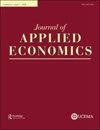Financial constraint and output pricing: the case of international sanctions against Iran
IF 1.4
4区 经济学
Q3 ECONOMICS
引用次数: 1
Abstract
ABSTRACT This paper examines whether financial constraints of firms influence their pricing behavior. To do so, a product-level dataset is used from Iranian-listed manufacturing companies. This study employs the imposition of international sanctions against Iran in 2012 as an exogenous shock to identify the effect of financial constraints. According to the results financially restricted firms keep their prices lower than their counterparts to increase their internal financial resources. The results show the difference between output prices of constrained and unconstrained firms rising after the imposition of sanctions. In addition, this relationship is affected by the degree of export-orientation of firms, and only exporter firms that experienced the negative demand shock after the sanctions, set their price lower to reduce the financial pressures. Also, the degree of dependency on imported input does not play a significant role in the relationship and ownership structure of firms has a significant impact on the relationship.金融约束与产出定价——以国际社会对伊朗的制裁为例
摘要本文考察企业的财务约束是否会影响其定价行为。为此,我们使用了伊朗上市制造公司的产品级数据集。本研究将2012年对伊朗实施的国际制裁作为外生冲击,以确定金融约束的影响。结果表明,资金受限的企业通过降低产品价格来增加内部资金来源。结果表明,制裁实施后,受约束企业和不受约束企业的产出价格之差增大。此外,这种关系受到企业出口导向程度的影响,只有在制裁后经历了负面需求冲击的出口企业才会降低价格以减轻财务压力。进口投入品依赖程度对进口投入品关系的影响不显著,企业所有权结构对进口投入品关系有显著影响。
本文章由计算机程序翻译,如有差异,请以英文原文为准。
求助全文
约1分钟内获得全文
求助全文
来源期刊

Journal of Applied Economics
ECONOMICS-
CiteScore
3.00
自引率
0.00%
发文量
57
审稿时长
40 weeks
期刊介绍:
The Journal of Applied Economics publishes papers which make a significant and original contribution to applied issues in micro and macroeconomics. The primary criteria for selecting papers are quality and importance for the field. Papers based on a meaningful and well-motivated research problem that make a concrete contribution to empirical economics or applied theory, in any of its fields, are especially encouraged. The wide variety of topics that are covered in the Journal of Applied Economics include: -Industrial Organization -International Economics -Labour Economics -Finance -Money and Banking -Growth -Public Finance -Political Economy -Law and Economics -Environmental Economics
 求助内容:
求助内容: 应助结果提醒方式:
应助结果提醒方式:


